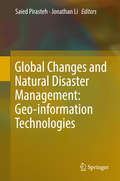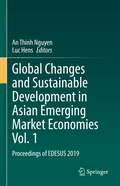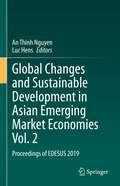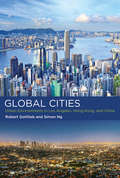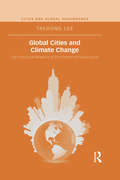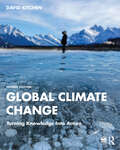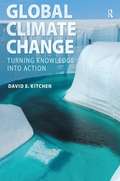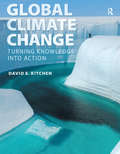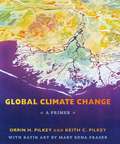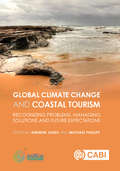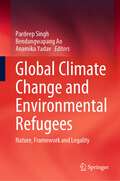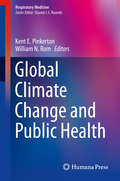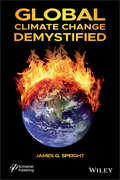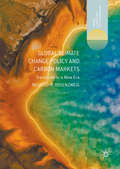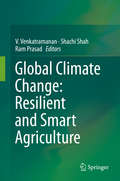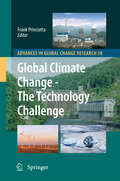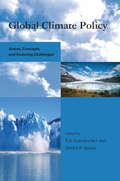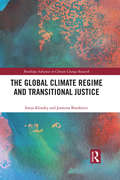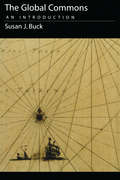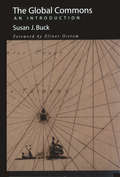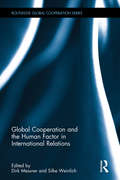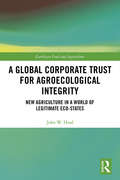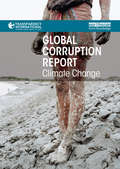- Table View
- List View
Global Changes and Natural Disaster Management: Geo-information Technologies
by Saied Pirasteh Jonathan LiThis book presents ongoing research and ideas related to earth observations and global change, natural hazards and disaster management studies, with respect to geospatial information technology, remote sensing, and global navigation satellite systems. Readers will discover uses of advanced geospatial tools, spatiotemporal models, and earth observation systems. Chapters identify the international aspects of the coupled social, land and climate systems in global change studies, and consider such global challenges as agriculture monitoring, the smart city, and risk assessment. The work presented here has been carefully selected, edited, and peer reviewed in order to advance research and development, as well as to encourage innovative applications of Geomatics technologies in global change studies. The book will appeal not only to academicians, but also to professionals, politicians and decision makers who wish to learn from the very latest and most innovative, quality research in this area of global change and natural disaster management. Contributions are drawn from revised submissions based on state-of-the-art papers from the 7th GiT4NDM - 5th EOGC, 2015 event.
Global Changes and Sustainable Development in Asian Emerging Market Economies Vol. 1: Proceedings of EDESUS 2019
by An Thinh Nguyen Luc HensThis two-volume set presents the conference papers from the 1st International Conference on Economics, Development and Sustainability (EDESUS 2019), organized by the University of Economics and Business, Vietnam National University, Hanoi. The collection addresses global changes and sustainable development in Vietnam and other emerging market economies in Asia, and covers wider topics such as economics and business (e.g. economic theory, national and international income distribution, macroeconomic policies, sectors of economy, productivity developments, financial market, business governance, bank financing), development and sustainability (e.g. developing process, development policy, public policy, sustainable growth, sustainability tools, sustainable livelihood, sustainable tourism, green growth), and resources and global change (e.g. human resources, natural resources, climate change, globalization, global challenges). The books are of interest to professors, researchers, lecturers, and students in economics and geography, consultants, and decision makers interested in global changes and sustainable development. Volume 1 focuses on economic development in Vietnam and other emerging market economies in Asia. This covers topics such as economics and business (e.g. economic theory, national and international income distribution, macroeconomic policies, sectors of economy, productivity developments, financial market, business governance, bank financing) and development studies (e.g. developing process, development policy, public policy, green growth).
Global Changes and Sustainable Development in Asian Emerging Market Economies Vol. 2: Proceedings of EDESUS 2019
by An Thinh Nguyen Luc HensThis two-volume set presents the conference papers from the 1st International Conference on Economics, Development and Sustainability (EDESUS 2019), organized by the University of Economics and Business, Vietnam National University, Hanoi. The collection addresses global changes and sustainable development in Vietnam and other emerging market economies in Asia, and covers wider topics such as economics and business (e.g. economic theory, national and international income distribution, macroeconomic policies, sectors of economy, productivity developments, financial market, business governance, bank financing), development and sustainability (e.g. developing process, development policy, public policy, sustainable growth, sustainability tools, sustainable livelihood, sustainable tourism, green growth), and resources and global change (e.g. human resources, natural resources, climate change, globalization, global challenges). The books are of interest to professors, researchers, lecturers, and students in economics and geography, consultants, and decision makers interested in global changes and sustainable development. Volume 2 focuses on global changes and sustainable development in Vietnam and other emerging market economies in Asia. This covers topics such as sustainability (e.g. sustainable growth, sustainability tools, sustainable livelihood, sustainable tourism), and change in resources globally (e.g. human resources, natural resources, climate change, globalization, global challenges).
Global Cities: Urban Environments in Los Angeles, Hong Kong, and China (Urban and Industrial Environments)
by Robert Gottlieb Simon NgHow Los Angeles, Hong Kong, and China deal with such urban environmental issues as ports, goods movement, air pollution, water quality, transportation, and public space.Over the past four decades, Los Angeles, Hong Kong, and key urban regions of China have emerged as global cities—in financial, political, cultural, environmental, and demographic terms. In this book, Robert Gottlieb and Simon Ng trace the global emergence of these urban areas and compare their responses to a set of six urban environmental issues.These cities have different patterns of development: Los Angeles has been the quintessential horizontal city, the capital of sprawl; Hong Kong is dense and vertical; China's new megacities in the Pearl River Delta, created by an explosion in industrial development and a vast migration from rural to urban areas, combine the vertical and the horizontal. All three have experienced major environmental changes in a relatively short period of time. Gottlieb and Ng document how each has dealt with challenges posed by ports and the movement of goods, air pollution (Los Angeles, Hong Kong, and urban China are all notorious for their hazardous air quality), water supply (all three places are dependent on massive transfers of water) and water quality, the food system (from seed to table), transportation, and public and private space. Finally they discuss the possibility of change brought about by policy initiatives and social movements.
Global Cities and Climate Change: The Translocal Relations of Environmental Governance (Cities and Global Governance)
by Taedong LeeCities have led the way to combat climate change by planning and implementing climate mitigation and adaptation policies. These local efforts go beyond national boundaries. Cities are forming transnational networks to enhance their understandings and practices for climate policies. In contrast to national governments that have numerous obstacles to cope with global climate change in the international and national level, cities have become significant international actors in the field of international relations and environmental governance. Global Cities and Climate Change examines the translocal relations of cities that have made an international effort to collectively tackle climate change. Compared to state-centric terms, international or trans-national relations, trans-local relations look at policies, politics, and interactions of local governments in the globalized world. Using multi-methods such as multi-level analysis, comparative case studies, regression analysis and network analysis, Taedong Lee illustrates why some cities participated in transnational climate networks for cities; under what conditions cities internationally cooperate with other cities, with which cities; and which factors influence climate policy performance. An essential read to all those who wish to understand the driving factors for local governments’ engagement in global climate governance from a theoretical as well as practical point of view. Lee makes a valuable contribution to the fields of international relations, environmental policies, and urban studies.
Global Climate Change: Turning Knowledge Into Action
by David KitchenEarth’s climate is changing. This book investigates the scientific, environmental, social, political, and economic aspects of climate change. It enables students to reach an informed opinion and encourages active engagement in finding solutions. It begins with a strong introduction to the scientific factors that drive natural and anthropogenic climate change and expands over three chapters to explore the impact of greenhouse gases on the distribution of solar energy across land, sea, ice, and air. The author examines geologically ancient climates in order to highlight possible future scenarios, and case studies from around the world highlight the impact of climate change on the physical and human environment. The final chapters investigate how society can respond to the challenges of climate change and overcome the political, social, and economic factors that are barriers to progress, focusing on the role of energy policy, fiscal policy, and risk assessment as a means to stimulate discussion about science, society, and the role of the media. Science is the foundation of any solution, but to turn this knowledge into action requires the application of a broad set of skills that are rooted in the liberal arts experience such as critical thinking, analytical thinking, problem solving, and communication. This textbook will be an essential resource for students taking courses in environmental geography, climate change, natural hazards, climatology, and meteorology.
Global Climate Change: Turning Knowledge Into Action
by David KitchenProvides a holistic introduction to climate change: examines of the physical evidence of climate change and impacts, whilst explaining the political, economic and social issues that stand in the way of action. Accessible to non-science majors, whilst also useful to science majors who are new to the topic Presents the issues from the many stakeholders and special interest groups in a balanced way – leaving it to the reader to make their own decisions. Case studies from across the globe bring home the actual socio-economic impact of climate change. Links current crisis to global energy and production and consumption. Evidence for climate change from around the globe is examined, with a focus on physical basis of Earth systems and global warming to differentiate between natural and anthropogenic causes. Ancient climates are explored to help provide context for modern climates, along with a deeper exploration of the climate record from the past 150 years, bridging discussions of social and economic impacts of climate change. Key changes for the new edition: Text updated throughout to reflect updated data and to make note of recent advances in climate science and climate policy in the USA and around the world, including the Paris Agreement, the Green New Deal, stakeholder upheavals, updates in economic models, carbon trading, emissions standards, progress in the developing world, new IPCC reports and communication. Web content updated with links to more recent reports, sites and videos.
Global Climate Change: Turning Knowledge Into Action
by David KitchenThis book examines what scientists know about global warming and climate change and considers political and economic solutions that will balance the competing needs of people around the world.
Global Climate Change: Turning Knowledge Into Action
by David E. KitchenThe science of climate change is a complex subject that balances the physical record and scientific fact with politics, policy, and ethics - and is of particular importance to the geosciences. This thoughtfully crafted new text and accompanying media encourage non-science majors to practice critical thinking, analysis, and discourse about climate change themes. Taking a cross-disciplinary approach, acclaimed educator and researcher, David Kitchen, examines not only the physical science, but the social, economic, political, energy, and environmental issues surrounding climate change. His goal: to turn knowledge into action, equipping students with the knowledge and critical skills to make informed decisions, separate facts from fiction, and participate in the public debate.
Global Climate Change: A Primer
by Orrin H. Pilkey Keith C. PilkeyAn internationally recognized expert on the geology of barrier islands, Orrin H. Pilkey is one of the rare academics who engages in public advocacy about science-related issues. He has written dozens of books and articles explaining coastal processes to lay readers, and he is a frequent and outspoken interviewee in the mainstream media. Here, the colorful scientist takes on climate change deniers in an outstanding and much-needed primer on the science of global change and its effects. After explaining the greenhouse effect, Pilkey, writing with son Keith, turns to the damage it is causing: sea level rise, ocean acidification, glacier and sea ice melting, changing habitats, desertification, and the threats to animals, humans, coral reefs, marshes, and mangroves. These explanations are accompanied by Mary Edna Fraser's stunning batiks depicting the large-scale arenas in which climate change plays out. The Pilkeys directly confront and rebut arguments typically advanced by global change deniers. Particularly valuable are their discussions of "Climategate," a manufactured scandal that undermined respect for the scientific community, and the denial campaigns by the fossil fuel industry, which they compare to the tactics used by the tobacco companies a generation ago to obfuscate findings on the harm caused by cigarettes.
Global Climate Change and Coastal Tourism
by Andrew Jones Michael PhillipsClimate Change and Coastal Tourism includes case studies on climate change and coastal tourism that explore current threats to and consequences of climate change on existing tourism coastal destinations. It assesses management and policy options for the future sustainability of threatened tourism coastal destinations. The cases discussed are from all regions of the world: Europe, The Americas, Asia, Africa, and Australasia. The book synthesize findings to make recommendations that can be used to promote strategies that ameliorate projected impacts of climate change on coastal tourism infrastructure and in turn promote the future sustainability of coastal tourism destinations.
Global Climate Change and Environmental Refugees: Nature, Framework and Legality
by Pardeep Singh Bendangwapang Ao Anamika YadavThis book explores the possibilities of understanding the concept of climate refugees in order to ascribe to a consensual agreement that climate refugees are evident and this situation is a reality.A framework to study both empirically and theoretically is presented in a detailed manner so that it may become a resource for understanding the challenges of climate refugees.Through discussion and analysis the book presents potential answers to such questions as:● Why has the international system been so short-sighted and has not given importance to the problems of climate migrants and refugees?● How to identify a climate refugee?● How do you justify a climate refugee or a migrant?● What are internally displaced people? Should we call them just refugees?The book covers the interdisciplinary nature of climate refugees and the perspectives of social science. The empirical findings provides an edge to holistically understanding climate refugees.This book discusses the concept of, what really is a climate refugee, and the necessary factors to make it an important part of the climate discourse. The legality of the term is missing in international parlance, and the academic discourse should provide the necessary critique required for the evolution of the subject under study. Therefore, the major objective of the book is to make the subject of climate migration known to all.
Global Climate Change and Public Health
by Kent E. Pinkerton William N. RomPulmonary physicians and scientists currently have minimal capacity to respond to climate change and its impacts on health. The extent to which climate change influences the prevalence and incidence of respiratory morbidity remains largely undefined. However, evidence is increasing that climate change does drive respiratory disease onset and exacerbation as a result of increased ambient and indoor air pollution, desertification, heat stress, wildfires, and the geographic and temporal spread of pollens, molds and infectious agents. Preliminary research has revealed climate change to have potentially direct and indirect adverse impacts on respiratory health. Published studies have linked climate change to increases in respiratory disease, including the following: changing pollen releases impacting asthma and allergic rhinitis, heat waves causing critical care-related diseases, climate driven air pollution increases, exacerbating asthma and COPD, desertification increasing particulate matter (PM) exposures, and climate related changes in food and water security impacting infectious respiratory disease through malnutrition (pneumonia, upper respiratory infections). High level ozone and ozone exposure has been linked to idiopathic pulmonary fibrosis, lung cancer, and acute lower respiratory infection. Global Climate Change and Public Health is an important new volume based on the research, findings, and discussions of US and international experts on respiratory health and climate change. This volume addresses issues of major importance to respiratory health and fills a major gap in the current literature. The ATS Climate Change and Respiratory Health Workshop was held in New Orleans, Louisiana, on May 15, 2010. The purpose of the meeting was to address the threat to global respiratory health posed by climate change. The workshop was attended by domestic and international experts as well as representatives of international respiratory societies and key US federal agencies. Dr. Pinkerton and Dr. Rom, the editors of this title, were co-chairs of the Climate Change Workshop and Symposium.
Global Climate Change Demystified
by James G. SpeightFor too many years climate change (also referred to as global warming) has been assigned predominantly to the emissions of carbon dioxide though the combustion of fossil fuels. It must never be forgotten or ignored, however, that the Earth is constantly changing since its formation and has gone through different eras like glaciations, among others. These changes need thousands of years to be made visible, and the current increase in the average temperature of the Earth since the pre-industrial period is happening, provided that the measurements of past climatic temperatures are accurate and beyond reproach. Thus, the assessment that the warming trend that has occurred over the past 100 years is very likely to have some origins in natural events. The precise contributions of natural effects and anthropogenic effects on the climate are not known, but it is accurate to conclude that many factors continue to influence climate. Whether or not human activities have become a dominant force in the changing climate and are responsible for most of the warming observed is still open to question. When studying the climate system of the Earth, an area of common confusion that relates to whether climate scientists agree or disagree as to whether or not climate change is happening, or if it is happening, whether or not humans are the primary cause. There are a variety of reasons for this, but a majority of scientists who study climate and publish in peer-reviewed journals agree that human activity is causing the warming of the Earth. The purpose of this book is to weigh all of these various data points and, in a scientific and unemotional way, arrive at likely conclusions regarding global climate change. Whether human activity is the main driver behind our current changes in climate, one thing is certain: Climate change is happening, and we all need to make informed, rather than emotional, decisions.
Global Climate Change Policy and Carbon Markets
by Richard H. RosenzweigIn this book, Richard Rosenzweig, describes the policies proposed and adopted in the first generation of climate change policy-making including the Kyoto Protocol and the carbon markets and assesses their failure to halt the increases of rising emissions of greenhouse gases. Carefully structured throughout, each chapter demonstrate how the first generation of policies failed because they were top down, overly ambitious and complex. The author uses the lessons drawn from this analysis to recommend more modest, targeted policies, arguing that they will be more successful in fighting climate change in the new era of policy-making. An invaluable reference for advanced undergraduate and graduate students in taking relevant courses in Environmental Policy, Law and Business. This book will also be a useful overview for researchers working in the field as well as those working in government and policy.
Global Climate Change: Resilient and Smart Agriculture
by V. Venkatramanan Shachi Shah Ram PrasadThis book provides essential insights into methods and practices of ‘Climate-smart Agriculture,’ which is driven by the principles of climate resilience and smart resource use in agricultural production. Climate-smart agriculture is a key policy instrument for achieving poverty eradication and a hunger-free world, as well as mitigating the effects of climate change. This book discusses in detail climate-smart agricultural technologies and practices that can reduce the vulnerability of agricultural systems, improve the livelihoods of farmers and other stakeholders, and reduce the greenhouse gas emissions from crop production and livestock husbandry. The agriculture, forestry and other land use (AFOLU) sector produces roughly 10–12 gigatons of CO2-equivalent per year; therefore, sustainable practices for agriculture and related land use hold immense potential to mitigate climate change. The potential impacts of climate variability and climate change on agriculture are extensively documented and articulated, especially with regard to global and national environmental agendas that call for innovation, transformation and climate-resilient advances in agriculture. As the book demonstrates, climate-smart agriculture offers an excellent tool for boosting agricultural output to feed the growing global population; for reducing greenhouse gases emissions from agriculture and other land use; and for protecting agricultural production systems from the impending dangers of climate change.
Global Climate Change - The Technology Challenge
by Frank PrinciottaIn order to avoid the potentially catastrophic impacts of global warming, the current 3% CO2 global emission growth rate must be transformed to a 1 to 3% declining rate, as soon as possible. This will require a rapid and radical transformation of the world's energy production and end use systems. The current generation of energy technologies are not capable of achieving the level of mitigation required. Next generations of renewable, low carbon generation and end use technologies will be needed. This book quantifies the mitigation challenge. It then considers the status of key technologies needed to protect the planet from serious climate change impact. Current and emerging technologies are characterized for their mitigation potential, status of development and potential environmental impacts. Power generation, mobile sources, industrial and building sectors are evaluated in detail. The importance and unique challenges for rapidly developing countries, such as China and India are discussed. Current global research and development efforts for key technologies are discussed. It is concluded that it will be necessary to substantially upgrade and accelerate the current worldwide RDD&D effort on both emerging energy technologies and those enabling technologies needed to improve mitigation effectiveness and economics. It will also be necessary to carefully evaluate the potential environmental characteristics of next generation technologies to avoid unacceptable health and ecological impacts. Finally, given the monumental technological challenge associated with transforming the world's energy system, geoengineering options are evaluated, since if successfully deployed, they have the potential to allow more time for the necessary energy system transformation. 'This book on Climate Change not only gives a clear picture of the problem but suggests many of the pitfalls in solving it and recommends strongly, a research program to fill the gaps in our knowledge. It is a most useful reference book for all aspects of the problem.' William D. Ruckelshaus, Madrona Venture Group/Evergreen Venture
Global Climate Governance Beyond 2012
by Frank Biermann Fariborz Zelli Philipp PattbergAn assessment of policy options for future global climate governance, written by a team of leading experts from the European Union and developing countries. Global climate governance is at a crossroads. The 1997 Kyoto Protocol was merely a first step, and its core commitments expire in 2012. This book addresses three questions which will be central to any new climate agreement. What is the most effective overall legal and institutional architecture for successful and equitable climate politics? What role should non-state actors play, including multinational corporations, non-governmental organizations, public-private partnerships and market mechanisms in general? How can we deal with the growing challenge of adapting our existing institutions to a substantially warmer world? This important resource offers policy practitioners in-depth qualitative and quantitative assessments of the costs and benefits of various policy options, and also offers academics from wide-ranging disciplines insight into innovative interdisciplinary approaches towards international climate negotiations.
Global Climate Policy: Actors, Concepts, and Enduring Challenges (Global Environmental Accord: Strategies for Sustainability and Institutional Innovation)
by Urs Luterbacher Detlef F. SprinzAnalyses of the international climate change regime consider the challenges of maintaining current structures and the possibilities for creating new forms of international cooperation.The current international climate change regime has a long history, and it is likely that its evolution will continue, despite such recent setbacks as the decision by President Donald Trump to withdraw the United States from the Paris Agreement of 2015. Indeed, the U.S. withdrawal may spur efforts by other members of the international community to strengthen the Paris accord on their own. This volume offers an original contribution to the study of the international political context of climate change over the last three decades, with fresh analyses of the current international climate change regime that consider both the challenges of maintaining current structures and the possibilities for creating new forms of international cooperation.The contributors are leading experts with both academic and policy experience; some are advisors to governments and the Climate Secretariat itself. Their contributions combine substantive evidence with methodological rigor. They discuss such topics as the evolution of the architecture of the climate change regime; different theoretical perspectives; game-theoretical and computer simulation approaches to modeling outcomes and assessing agreements; coordination with other legal regimes; non-state actors; developing and emerging countries; implementation, compliance, and effectiveness of agreements; and the challenges of climate change mitigation after the Paris Agreement.ContributorsMichaël Aklin, Guri Bang, Daniel Bodansky, Thierry Bréchet, Lars Brückner, Frank Grundig, Jon Hovi, Yasuko Kameyama, Urs Luterbacher, Axel Michaelowa, Katharina Michaelowa, Carla Norrlof, Matthew Paterson, Lavanya Rajamani, Tora Skodvin, Detlef F. Sprinz, Arild Underdal, Jorge E. Viñuales, Hugh Ward
The Global Climate Regime and Transitional Justice (Routledge Advances in Climate Change Research)
by Jasmina Brankovic Sonja KlinskyGeopolitical changes combined with the increasing urgency of ambitious climate action have re-opened debates about justice and international climate policy. Mechanisms and insights from transitional justice have been used in over thirty countries across a range of conflicts at the interface of historical responsibility and imperatives for collective futures. However, lessons from transitional justice theory and practice have not been systematically explored in the climate context. The comparison gives rise to new ideas and strategies that help address climate change dilemmas. This book examines the potential of transitional justice insights to inform global climate governance. It lays out core structural similarities between current global climate governance tensions and transitional justice contexts. It explores how transitional justice approaches and mechanisms could be productively applied in the climate change context. These include responsibility mechanisms such as amnesties, legal accountability measures, and truth commissions, as well as reparations and institutional reform. The book then steps beyond reformist transitional justice practice to consider more transformative approaches, and uses this to explore a wider set of possibilities for the climate context. Each chapter presents one or more concrete proposals arrived at by using ideas from transitional justice and applying them to the justice tensions central to the global climate context. By combining these two fields the book provides a new framework through which to understand the challenges of addressing harms and strengthening collective climate action. This book will be of great interest to scholars and practitioners of climate change and transitional justice.
The Global Commons: An Introduction
by Susan J. BuckAntarctica, the high seas and deep seabed, the atmosphere, and space are increasingly accessible - and exploited - resource domains. Collectively known as the global commons, they represent a new and profound challenge for international law and institutions. In The Global Commons, Susan Buck considers the unique physical, legal, management, and policy problems associated with these areas. The book is a clear, useful introduction to the subject that will be of interest to general readers as well as to students in international relations, international law, and environmental law and policy.
The Global Commons: An Introduction
by Elinor Ostrom Susan J. BuckVast areas of valuable resources unfettered by legal rights have, for centuries, been the central target of human exploitation and appropriation. The global commons -- Antarctica, the high seas and deep seabed minerals, the atmosphere, and space -- have remained exceptions only because access has been difficult or impossible, and the technology for successful extraction has been lacking. Now, technology has caught up with desire, and management regimes are needed to guide human use of these important resource domains.In The Global Commons, Susan Buck considers the history of human interactions with each of the global commons areas and provides a concise yet thorough account of the evolution of management regimes for each area. She explains historical underpinnings of international law, examines the stakeholders involved, and discusses current policy and problems associated with it.Buck applies key analytical concepts drawn from institutional analysis and regime theory to examine how legal and political concerns have affected the evolution of management regimes for the global commons. She presents in-depth case studies of each of the four regimes, outlining the historical evolution of the commons -- development of interest in exploiting the resource domain; conflicts among nations over the use of the commons; and efforts to design institutions to control access to the domains and to regulate their use -- and concluding with a description of the management regime that eventually emerged from the informal and formal negotiations.The Global Commons provides a clear, useful introduction to the subject that will be of interest to general readers as well as to students in international relations and international environmental law, and in environmental law and policy generally.
Global Cooperation and the Human Factor in International Relations (Routledge Global Cooperation Series)
by Dirk Messner Silke WeinlichThis book aims to pave the way for a new interdisciplinary approach to global cooperation research. It does so by bringing in disciplines whose insights about human behaviour might provide a crucial yet hitherto neglected foundation for understanding how and under which conditions global cooperation can succeed. As the first profoundly interdisciplinary book dealing with global cooperation, it provides the state of the art on human cooperation in selected disciplines (evolutionary anthropology and biology, decision-sciences, social psychology, complex system sciences), written by leading experts. The book argues that scholars in the field of global governance should know and could learn from what other disciplines tell us about the capabilities and limits of humans to cooperate. This new knowledge will generate food for thought and cause creative disturbances, allowing us a different interpretation of the obstacles to cooperation observed in world politics today. It also offers first accounts of interdisciplinary global cooperation research, for instance by exploring the possibilities and consequences of global we-identities, by describing the basic cooperation mechanism that are valid across disciplines, or by bringing an evolutionary perspective to diplomacy. This book will be of great interest to scholars and postgraduates in International Relations, Global Governance and International Development.
A Global Corporate Trust for Agroecological Integrity: New Agriculture in a World of Legitimate Eco-states (Earthscan Food and Agriculture)
by John W. HeadThis book examines global environmental governance and how legal, institutional, and conceptual reform can facilitate a transformation to a new ‘natural-systems’ form of agriculture. Profound global climate disruption makes it essential that we replace our current agricultural system – described in this book as a fossil-carbon-dependent ‘modern extractive agriculture’ – with a natural-systems agriculture featuring perennial grains growing in polycultures, thereby mimicking the natural grassland and forest ecosystems that modern extractive agriculture has largely destroyed. After examining relevant international legal and conceptual foundations (sovereignty, federalism, global governance) and existing international organizations focusing on agriculture, the book explores legal and institutional opportunities to facilitate dramatic agricultural reform and ecological restoration. Among other things, it explains how innovative federalism structures around the world provide patterns for reorienting global environmental governance, including what the book calls eco-states that would, through exercise of pluralistic sovereignty, be responsible for agroecological management. Drawing from his experience working in international institutions, the author provides detailed global-governance proposals for facilitating the type of agricultural reform that can help avoid ecological collapse, especially through soil degradation and climate change. This book will be of great interest to students and scholars of international law, agroecology, climate change, ecological restoration, sustainable development, and global governance, as well as policy-makers and practitioners working in these fields.
Global Corruption Report: Climate Change
by Transparency InternationalThe global response to climate change will demand unprecedented international cooperation, deep economic transformation and resource transfers at a significant scale. Corruption threatens to jeopardise these efforts. Transparency International's Global Corruption Report: Climate Change is the first publication to comprehensively explore such corruption risks. More than fifty leading experts and practitioners contribute, covering four key areas: governance: investigating major governance challenges towards tackling climate change mitigating climate change: reducing greenhouse gas emissions with transparency and accountability adapting to climate change: identifying corruption risks in climate-proofing development, financing and implementation of adaptation forestry governance: responding to the corruption challenges plaguing the forestry sector, and how these challenges need to be integrated into current international strategies to halt deforestation and promote reforestation. The Global Corruption Report: Climate Change provides essential policy analysis to help policy-makers, practitioners and other stakeholders understand these risks and develop effective responses at a critical point in time when the main architecture for climate governance is being developed.
